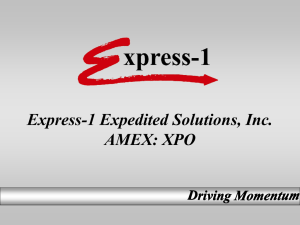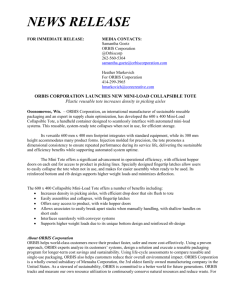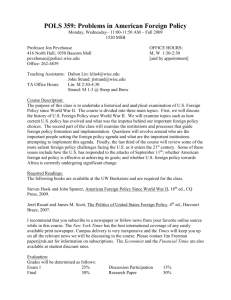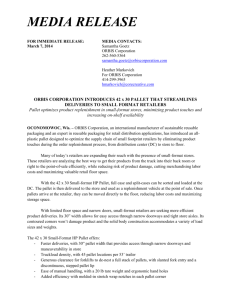Contrarian thinking in action
advertisement
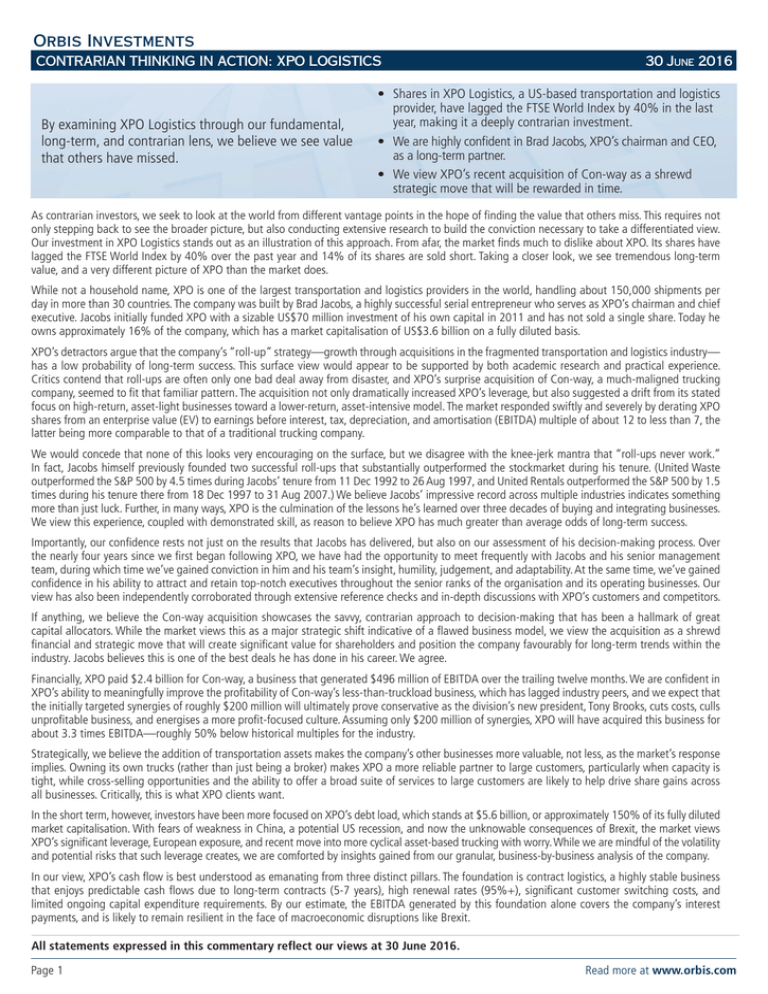
Orbis Investments CONTRARIAN THINKING IN ACTION: XPO LOGISTICS By examining XPO Logistics through our fundamental, long-term, and contrarian lens, we believe we see value that others have missed. 30 June 2016 • Shares in XPO Logistics, a US-based transportation and logistics provider, have lagged the FTSE World Index by 40% in the last year, making it a deeply contrarian investment. • We are highly confident in Brad Jacobs, XPO’s chairman and CEO, as a long-term partner. • We view XPO’s recent acquisition of Con-way as a shrewd strategic move that will be rewarded in time. As contrarian investors, we seek to look at the world from different vantage points in the hope of finding the value that others miss. This requires not only stepping back to see the broader picture, but also conducting extensive research to build the conviction necessary to take a differentiated view. Our investment in XPO Logistics stands out as an illustration of this approach. From afar, the market finds much to dislike about XPO. Its shares have lagged the FTSE World Index by 40% over the past year and 14% of its shares are sold short. Taking a closer look, we see tremendous long-term value, and a very different picture of XPO than the market does. While not a household name, XPO is one of the largest transportation and logistics providers in the world, handling about 150,000 shipments per day in more than 30 countries. The company was built by Brad Jacobs, a highly successful serial entrepreneur who serves as XPO’s chairman and chief executive. Jacobs initially funded XPO with a sizable US$70 million investment of his own capital in 2011 and has not sold a single share. Today he owns approximately 16% of the company, which has a market capitalisation of US$3.6 billion on a fully diluted basis. XPO’s detractors argue that the company’s “roll-up” strategy­­—growth through acquisitions in the fragmented transportation and logistics industry— has a low probability of long-term success. This surface view would appear to be supported by both academic research and practical experience. Critics contend that roll-ups are often only one bad deal away from disaster, and XPO’s surprise acquisition of Con-way, a much-maligned trucking company, seemed to fit that familiar pattern. The acquisition not only dramatically increased XPO’s leverage, but also suggested a drift from its stated focus on high-return, asset-light businesses toward a lower-return, asset-intensive model. The market responded swiftly and severely by derating XPO shares from an enterprise value (EV) to earnings before interest, tax, depreciation, and amortisation (EBITDA) multiple of about 12 to less than 7, the latter being more comparable to that of a traditional trucking company. We would concede that none of this looks very encouraging on the surface, but we disagree with the knee-jerk mantra that “roll-ups never work.” In fact, Jacobs himself previously founded two successful roll-ups that substantially outperformed the stockmarket during his tenure. (United Waste outperformed the S&P 500 by 4.5 times during Jacobs’ tenure from 11 Dec 1992 to 26 Aug 1997, and United Rentals outperformed the S&P 500 by 1.5 times during his tenure there from 18 Dec 1997 to 31 Aug 2007.) We believe Jacobs’ impressive record across multiple industries indicates something more than just luck. Further, in many ways, XPO is the culmination of the lessons he’s learned over three decades of buying and integrating businesses. We view this experience, coupled with demonstrated skill, as reason to believe XPO has much greater than average odds of long-term success. Importantly, our confidence rests not just on the results that Jacobs has delivered, but also on our assessment of his decision-making process. Over the nearly four years since we first began following XPO, we have had the opportunity to meet frequently with Jacobs and his senior management team, during which time we’ve gained conviction in him and his team’s insight, humility, judgement, and adaptability. At the same time, we’ve gained confidence in his ability to attract and retain top-notch executives throughout the senior ranks of the organisation and its operating businesses. Our view has also been independently corroborated through extensive reference checks and in-depth discussions with XPO’s customers and competitors. If anything, we believe the Con-way acquisition showcases the savvy, contrarian approach to decision-making that has been a hallmark of great capital allocators. While the market views this as a major strategic shift indicative of a flawed business model, we view the acquisition as a shrewd financial and strategic move that will create significant value for shareholders and position the company favourably for long-term trends within the industry. Jacobs believes this is one of the best deals he has done in his career. We agree. Financially, XPO paid $2.4 billion for Con-way, a business that generated $496 million of EBITDA over the trailing twelve months. We are confident in XPO’s ability to meaningfully improve the profitability of Con-way’s less-than-truckload business, which has lagged industry peers, and we expect that the initially targeted synergies of roughly $200 million will ultimately prove conservative as the division’s new president, Tony Brooks, cuts costs, culls unprofitable business, and energises a more profit-focused culture. Assuming only $200 million of synergies, XPO will have acquired this business for about 3.3 times EBITDA—roughly 50% below historical multiples for the industry. Strategically, we believe the addition of transportation assets makes the company’s other businesses more valuable, not less, as the market’s response implies. Owning its own trucks (rather than just being a broker) makes XPO a more reliable partner to large customers, particularly when capacity is tight, while cross-selling opportunities and the ability to offer a broad suite of services to large customers are likely to help drive share gains across all businesses. Critically, this is what XPO clients want. In the short term, however, investors have been more focused on XPO’s debt load, which stands at $5.6 billion, or approximately 150% of its fully diluted market capitalisation. With fears of weakness in China, a potential US recession, and now the unknowable consequences of Brexit, the market views XPO’s significant leverage, European exposure, and recent move into more cyclical asset-based trucking with worry. While we are mindful of the volatility and potential risks that such leverage creates, we are comforted by insights gained from our granular, business-by-business analysis of the company. In our view, XPO’s cash flow is best understood as emanating from three distinct pillars. The foundation is contract logistics, a highly stable business that enjoys predictable cash flows due to long-term contracts (5-7 years), high renewal rates (95%+), significant customer switching costs, and limited ongoing capital expenditure requirements. By our estimate, the EBITDA generated by this foundation alone covers the company’s interest payments, and is likely to remain resilient in the face of macroeconomic disruptions like Brexit. All statements expressed in this commentary reflect our views at 30 June 2016. Page 1 Read more at www.orbis.com Orbis Investments CONTRARIAN THINKING IN ACTION: XPO LOGISTICS 30 June 2016 On top of this, the second pillar comes from XPO’s significant asset-light transportation businesses, which consists of truck brokerage, freight forwarding, and intermodal transport. The brokerage business also enjoys countercyclical characteristics, including rising margins during recessionary periods. The final pillar is the asset-based transportation (trucking) business; even if cash flow from this business went to zero, we believe XPO could still comfortably cover its interest expenses. We also think the equity market poorly understands the inherent cyclicality of XPO’s cash flows and gets overly obsessed with short-term transportation news flow. We’ve found it interesting to see XPO bonds trade firmly on news flow perceived to be negative by equity markets. Indeed, the company’s liabilities are spread out manageably over time (73% of debt matures after 2021) and are without any covenants that give us cause for concern. To be fair, XPO has yet to generate free cash flow as it has gone through a meaningful consolidation phase with sizable investments in technology (over $400 million per year), and real cash outlays relating to things like severance and the cost of terminating uneconomic contracts. Yet all of this is consistent with what we forecast, and, importantly, we expect a positive inflection in free cash flow as this consolidation and investment phase normalises, synergies are realised, and the business continues to grow, all while interest costs decline and capex remains essentially flat. We believe the realisation of significant cash flow will be an important milestone for XPO, and that this will help reveal the company’s intrinsic value to be substantially higher than the current share price. Importantly, management incentives are aligned with shareholders’ and tied to driving cash flow and total shareholder return. For instance, a meaningful portion of the management team’s long-term compensation is tied to achieving adjusted earnings of $2.75 per share in 2017 and a share price threshold of $60 by April 2018, or, alternatively, achieving $4.30 of adjusted earnings by 2019 and a share price threshold of $86 per share by September 2020. These performance targets, while ambitious, offer some perspective on both the team’s internal confidence and the long-term return potential of the stock. As XPO demonstrates its earnings power over time, we believe the value of the company will be multiples above the current market price of $26 per share. Of course, we cannot be certain if others will come to share our view, but we do know that XPO shares are concentrated in a very limited number of hands. Senior management owns about 18% of diluted shares outstanding. Orbis owns approximately 15% on clients’ behalf, and a collection of five other long-term investors own about 30%. Altogether, we think about two-thirds of the company is owned by investors who believe intrinsic value is substantially higher than the current share price. With passive funds likely holding another 15% of shares, we estimate approximately 80% of XPO shares are in the hands of long-term investors. With 14% of shares being sold short by hedge funds, liquidity could evaporate quickly and push the shares sharply higher if the intrinsic earnings power of XPO that we see becomes clear. In summary, XPO is a company whose value is difficult to see without careful analysis, a longer-term perspective, and a willingness to defy conventional wisdom. By examining the company through our fundamental, long-term, and contrarian lens, we believe we see value that others have missed. All statements expressed in this commentary reflect our views at 30 June 2016. These materials do not constitute an offer or solicitation to invest in the Orbis Funds. Subscriptions are only valid if made on the basis of the current prospectus or offering memorandum of an Orbis Fund. FTSE: FTSE World Index data source is FTSE International Limited (“FTSE”) © FTSE 2015. FTSE is a trade mark of the London Stock Exchange Group companies and is used by FTSE under licence. All rights in the FTSE indices and/ or FTSE ratings vest in FTSE and/or its licensors. Neither FTSE nor its licensors accept any liability for any errors or omissions in the FTSE indices and/or FTSE ratings or underlying data. No further distribution of FTSE data is permitted without FTSE’s express written consent. Adam Karr Bachelor of Arts in Economics (Northwestern University), Master of Business Administration (Harvard University). Adam joined Orbis in 2002 and leads the US-based investment team. He is the Managing Director of Orbis US, and is a Director of Orbis Holdings Limited and Orbis Allan Gray Limited. He previously worked as a partner at Palladium Equity Partners and as a financial analyst at Donaldson, Lufkin & Jenrette. He is a trustee at Northwestern University. Matthew Adams, Bachelor of Science in Electrical Engineering (United States Military Academy), Master of Philosophy in Engineering (Cambridge University), Master of Science in Electrical Engineering (University of Washington), Master of Business Administration (Stanford Graduate School of Business). Matthew joined Orbis in 2010. His responsibilities include leading the team’s investment research process and researching the US industrials sector. He has previous experience as an officer in the United States Army where he held a variety of leadership roles. Page 2 Read more at www.orbis.com Orbis Investments CONTRARIAN THINKING IN ACTION: XPO LOGISTICS 30 June 2016 Legal Notices Past performance is not a reliable indicator of future results. Fund share prices fluctuate and are not guaranteed. Returns may decrease or increase as a result of currency fluctuations. When making an investment in the Funds, an investor’s capital is at risk. This commentary does not constitute advice nor a recommendation to buy, sell or hold, nor an offer to sell or a solicitation to buy interests or shares in the Orbis Funds or other securities in the companies mentioned in it, nor does it constitute financial advice. Subscriptions are only valid if made on the basis of the current Prospectus of an Orbis Fund. The discussion topics for the commentaries were selected, and the commentaries were finalised and approved, by either Orbis Investment Management Limited or Orbis Investment Management (B.V.I) Limited, the Funds’ Manager or Portfolio Manager, as the case may be. Information in this Report is based on sources believed to be accurate and reliable and provided “as is” and in good faith. The Orbis Group does not make any representation or warranty as to accuracy, reliability, timeliness or completeness of the information in this Report. The Orbis Group disclaims all liability (whether arising in contract, tort, negligence or otherwise) for any error, omission, loss or damage (whether direct, indirect, consequential or otherwise) in connection with the information in this Report. This Report has been approved for issue in the United Kingdom by Orbis Investment Advisory Limited, 15 Portland Place, London, England W1B 1PT; a firm authorised and regulated by the Financial Conduct Authority. Orbis Investment Management Limited and Orbis Investment Management (B.V.I.) Limited, the Funds’ Manager or Portfolio Manager, are licensed to conduct investment business by the Bermuda Monetary Authority. If you are an investor in Australia, pursuant to Regulation 7.1.33B of the Corporations Regulations, this document is provided to you on behalf of the relevant Orbis Funds by Orbis Investment Advisory Pty Ltd, Australia Financial Services Licence No. 237862, Australia Business Number 15 101 387 964. Collective Investment Schemes (CIS) are generally medium to long-term investments. The value of an investment in the Funds may go down as well as up, and past performance is not a reliable indicator of future results. No Manager or Portfolio Manager provides any guarantee with respect to capital or the Funds’ returns. CIS are traded at ruling prices and can engage in borrowing and scrip lending. Commission and incentives may be paid by investors to third parties and, if so, would be included in the overall costs. Performance shown is for the Fund or share class indicated. Individual investors’ performance may differ as a result of investment date, reinvestment date and dividend withholding tax, as well as a levy that may apply in the case of transactions representing more than 5% of a Fund’s net asset value. Any Fund may be closed to new investments at any time in order to be managed in accordance with its mandate. The Funds invest in foreign securities. Depending on their markets, trading in those securities may carry risks relating to, among others, macroeconomic and political circumstances, constraints on liquidity or the repatriation of funds, foreign exchange rate fluctuations, taxation and trade settlement. Notice to Persons in the European Economic Area (EEA) Each sub-fund of Orbis SICAV, a UCITS IV compliant Luxembourg fund, described in this Report is admitted for public marketing in Ireland, Luxembourg, the Netherlands, Norway, Sweden and the United Kingdom. The Orbis Funds that are not Orbis SICAV Funds are alternative investment funds that are neither admitted for public marketing anywhere in the EEA nor marketed in the EEA for purposes of the Alternative Investment Fund Managers Directive. As a result, persons located in any EEA member state will only be permitted to subscribe for shares in the Orbis Funds that are admitted for public marketing in that member state or under certain circumstances as determined by, and in compliance with, applicable law. Fund Minimums and Prospectuses Minimum investment amounts in the Orbis Funds are specified in the respective Fund’s Prospectus, provided that a new investor in the Orbis Funds must open an investment account with Orbis, which may be subject to minimum investment restrictions, country restrictions and/or other terms and conditions. For more information on opening an Orbis investment account, please visit www.orbis.com. Clients investing via Allan Gray, which includes the Allan Gray Investment Platform, an Allan Gray investment pool or otherwise through Allan Gray Nominees remain subject to the investment minimums specified by the applicable terms and conditions. Copies of the Funds’ Prospectuses are also aavailable upon request from Allan Gray Unit Trust Management (RF) Proprietary Limited, a Member of the Association for Savings & Investments SA. Fees and Charges The management fees associated with the Funds vary depending upon the share class an investor purchases. Not all share classes are offered by each Fund, and the eligibility criteria for different share classes and/or different Funds vary. Each Orbis Fund’s Prospectus (available on www.orbis.com) describes the management fees, share classes and eligibility criteria of that Fund. Below are descriptions of the fees borne by the Funds and share classes specified, which are subject to the lengthier descriptions in the relevant Fund’s Prospectus. Fees and Charges (Investors in South Africa) Shares of Orbis Global Equity Fund and Investor Share Classes of the Orbis SICAV Funds (Global Balanced, Asia ex-Japan Equity and Japan Equity): The Funds pay a performance-based fee. The fee is based on the net asset value of the Fund (share class, in the case of the Orbis SICAV Funds). The fee rate is calculated weekly by comparing the Fund’s (share class, in the case of the Orbis SICAV Funds) performance over three years against its benchmark. For each percentage point of three year performance above or below that benchmark’s performance, 0.04 percentage points are added to or subtracted from 1.5%, subject to (a) a maximum fee of 2.5% per annum and (b) a minimum fee of 0.5% per annum. Standard Share Classes of Orbis Optimal SA Fund Limited: There are two parts to the fee: (a) a base fee of 1.0% per annum, paid monthly, of the total net assets of each share class; plus (b) a performance fee of 20% of the outperformance of each class of Fund share’s weekly rate of return relative to its performance fee hurdle, calculated and accrued on each dealing day and paid monthly. The performance fee incorporates a high water mark. A schedule of fees and charges and maximum commissions is available on request from the appropriate Manager. Page 3 Read more at www.orbis.com

